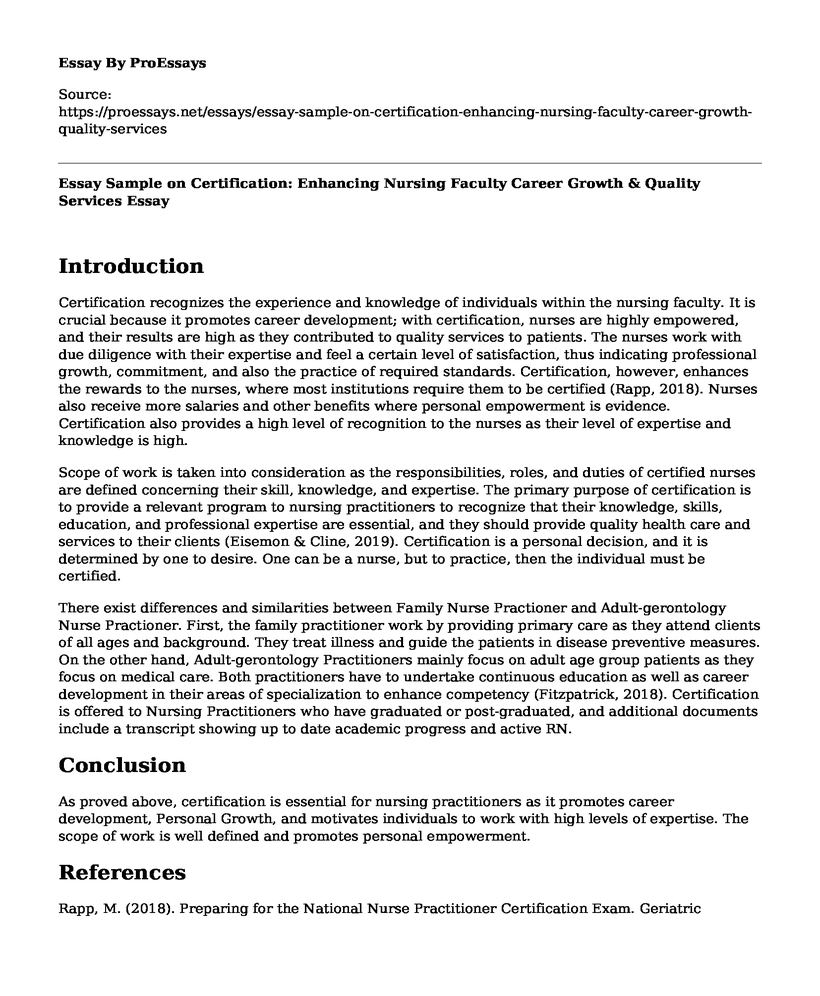Introduction
Certification recognizes the experience and knowledge of individuals within the nursing faculty. It is crucial because it promotes career development; with certification, nurses are highly empowered, and their results are high as they contributed to quality services to patients. The nurses work with due diligence with their expertise and feel a certain level of satisfaction, thus indicating professional growth, commitment, and also the practice of required standards. Certification, however, enhances the rewards to the nurses, where most institutions require them to be certified (Rapp, 2018). Nurses also receive more salaries and other benefits where personal empowerment is evidence. Certification also provides a high level of recognition to the nurses as their level of expertise and knowledge is high.
Scope of work is taken into consideration as the responsibilities, roles, and duties of certified nurses are defined concerning their skill, knowledge, and expertise. The primary purpose of certification is to provide a relevant program to nursing practitioners to recognize that their knowledge, skills, education, and professional expertise are essential, and they should provide quality health care and services to their clients (Eisemon & Cline, 2019). Certification is a personal decision, and it is determined by one to desire. One can be a nurse, but to practice, then the individual must be certified.
There exist differences and similarities between Family Nurse Practioner and Adult-gerontology Nurse Practioner. First, the family practitioner work by providing primary care as they attend clients of all ages and background. They treat illness and guide the patients in disease preventive measures. On the other hand, Adult-gerontology Practitioners mainly focus on adult age group patients as they focus on medical care. Both practitioners have to undertake continuous education as well as career development in their areas of specialization to enhance competency (Fitzpatrick, 2018). Certification is offered to Nursing Practitioners who have graduated or post-graduated, and additional documents include a transcript showing up to date academic progress and active RN.
Conclusion
As proved above, certification is essential for nursing practitioners as it promotes career development, Personal Growth, and motivates individuals to work with high levels of expertise. The scope of work is well defined and promotes personal empowerment.
References
Rapp, M. (2018). Preparing for the National Nurse Practitioner Certification Exam. Geriatric
Nursing, 28(3), 168-169. Doi: 10.1016/j.gerinurse.2007.04.007
Fitzpatrick, J. (2018). The Case for Certification and Certification Research. Nursing Education
Perspectives, 33(6), 363-363. Doi: 10.5480/1536-5026-33.6.363
Eisemon, N., & Cline, A. (2019). The Value of Certification. Gastroenterology Nursing, 29(6), 428-43.Doi: 10.1097/00001610-200611000-00001
Cite this page
Essay Sample on Certification: Enhancing Nursing Faculty Career Growth & Quality Services. (2023, Apr 10). Retrieved from https://proessays.net/essays/essay-sample-on-certification-enhancing-nursing-faculty-career-growth-quality-services
If you are the original author of this essay and no longer wish to have it published on the ProEssays website, please click below to request its removal:
- Medicine Essay Sample: Human Immunodeficiency Virus (HIV)
- Reflection on Public Health Program Paper Example
- Chronic Obstructive Pulmonary Disease (COPD) Paper Example
- The Opioid Crisis in America
- Essay on Coronavirus, Covid-19: Contagion Movie Predicted Global Pandemic & Mass Surveillance
- Essay Example on Obesity Epidemic: Diet, Exercise & Bariatric Surgery
- COVID-19 in NYC: How My Life Changed in the Pandemic - Essay Sample







